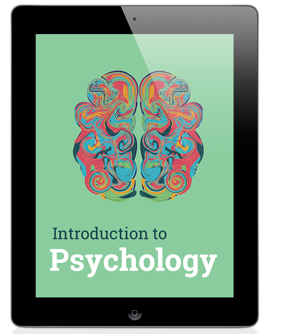 Introduction to Psychology offers students a comprehensive guide to core psychological concepts. Aligned with APA learning outcomes, the course emphasizes disciplinary diversity and the skeptical habits of a scientific mind. It features engaging, interactive practice and contemporary, multimodal learning that foster a meaningful exploration of a vast and growing field.
Introduction to Psychology offers students a comprehensive guide to core psychological concepts. Aligned with APA learning outcomes, the course emphasizes disciplinary diversity and the skeptical habits of a scientific mind. It features engaging, interactive practice and contemporary, multimodal learning that foster a meaningful exploration of a vast and growing field.
In a conversational tone, Introduction to Psychology leads students to a foundational and relevant understanding of psychology through a consistent focus on applying concepts in their own lives.
Table of Contents:
Chapter 1: Psychological Science
| 1.1 |
What is Psychology? |
| 1.2 |
Contemporary Psychology |
| 1.3 |
Why Is Research Important? |
| 1.4 |
Approaches to Research |
| 1.5 |
Analyzing Findings |
| 1.6 |
Ethics |
| Chapter 1 Review |
Chapter 1 Review |
Chapter 2: Biopsychology
| 2.1 |
Human Genetics |
| 2.2 |
Cells of the Nervous System |
| 2.3 |
Parts of the Nervous System |
| 2.4 |
The Brain and Spinal Cord |
| 2.5 |
The Endocrine System |
| Chapter 2 Review |
Chapter 2 Review |
Chapter 3: States of Consciousness
| 3.1 |
What Is Consciousness? |
| 3.2 |
Sleep and Why We Sleep |
| 3.3 |
Stages of Sleep |
| 3.4 |
Sleep Problems and Disorders |
| 3.5 |
Substance Use and Abuse |
| 3.6 |
Other States of Consciousness |
| Chapter 3 Review |
Chapter 3 Review |
Chapter 4: Sensation and Perception
| 4.1 |
Sensation versus Perception |
| 4.2 |
Waves and Wavelengths |
| 4.3 |
Vision |
| 4.4 |
Hearing |
| 4.5 |
The Other Senses |
| 4.6 |
Gestalt Principles of Perception |
| Chapter 4 Review |
Chapter 4 Review |
Chapter 5: Learning
| 5.1 |
What Is Learning? |
| 5.2 |
Classical Conditioning |
| 5.3 |
Operant Conditioning |
| 5.4 |
Observational Learning (Modeling) |
| Chapter 5 Review |
Chapter 5 Review |
Chapter 6: Thinking and Intelligence
| 6.1 |
What Is Cognition? |
| 6.2 |
Language |
| 6.3 |
Problem Solving |
| 6.4 |
What Are Intelligence and Creativity? |
| 6.5 |
Measures of Intelligence |
| 6.6 |
The Source of Intelligence |
| Chapter 6 Review |
Chapter 6 Review |
Chapter 7: Memory
| 7.1 |
How Memory Functions |
| 7.2 |
Parts of the Brain Involved with Memory |
| 7.3 |
Problems with Memory |
| 7.4 |
Ways to Enhance Memory |
| Chapter 7 Review |
Chapter 7 Review |
Chapter 8: Lifespan Development
| 8.1 |
What Is Lifespan Development? |
| 8.2 |
Lifespan Theories |
| 8.3 |
Stages of Development |
| 8.4 |
Death and Dying |
| Chapter 8 Review |
Chapter 8 Review |
Chapter 9: Emotion and Motivation
| 9.1 |
Motivation |
| 9.2 |
Hunger and Eating |
| 9.3 |
Sexual Behavior |
| 9.4 |
Emotion |
| Chapter 9 Review |
Chapter 9 Review |
Chapter 10: Personality
| 10.1 |
What Is Personality? |
| 10.2 |
Freud and the Psychodynamic Perspective |
| 10.3 |
Neo-Freudians: Adler, Erikson, Jung, and Horney |
| 10.4 |
Learning Approaches |
| 10.5 |
Humanistic Approaches |
| 10.6 |
Biological Approaches |
| 10.7 |
Trait Theorists |
| 10.8 |
Cultural Understandings of Personality |
| 10.9 |
Personality Assessment |
| Chapter 10 Review |
Chapter 10 Review |
Chapter 11: Social Psychology
| 11.1 |
What Is Social Psychology? |
| 11.2 |
Self-presentation |
| 11.3 |
Attitudes and Persuasion |
| 11.4 |
Conformity, Compliance, and Obedience |
| 11.5 |
Prejudice and Discrimination |
| 11.6 |
Aggression |
| 11.7 |
Prosocial Behavior |
| Chapter 11 Review |
Chapter 11 Review |
Chapter 12: Industrial-Organizational Psychology
| 12.1 |
What Is Industrial and Organizational Psychology? |
| 12.2 |
Industrial Psychology: Selecting and Evaluating Employees |
| 12.3 |
Organizational Psychology: The Social Dimension of Work |
| 12.4 |
Human Factors Psychology and Workplace Design |
| Chapter 12 Review |
Chapter 12 Review |
Chapter 13: Stress, Lifestyle, and Health
| 13.1 |
What Is Stress? |
| 13.2 |
Stressors |
| 13.3 |
Stress and Illness |
| 13.4 |
Regulation of Stress |
| 13.5 |
The Pursuit of Happiness |
| Chapter 13 Review |
Chapter 13 Review |
Chapter 14: Psychological Disorders
| 14.1 |
What Are Psychological Disorders? |
| 14.2 |
Diagnosing and Classifying Psychological Disorders |
| 14.3 |
Perspectives on Psychological Disorders |
| 14.4 |
Anxiety Disorders |
| 14.5 |
Obsessive-Compulsive and Related Disorders |
| 14.6 |
Posttraumatic Stress Disorder |
| 14.7 |
Mood Disorders |
| 14.8 |
Schizophrenia |
| 14.9 |
Dissociative Disorders |
| 14.10 |
Personality Disorders |
| 14.11 |
Disorders in Childhood |
| Chapter 14 Review |
Chapter 14 Review |
Chapter 15: Therapy and Treatment
| 15.1 |
Mental Health Treatment: Past and Present |
| 15.2 |
Types of Treatment |
| 15.3 |
Treatment Modalities |
| 15.4 |
Substance-Related and Addictive Disorders: A Special Case |
| 15.5 |
The Sociocultural Model and Therapy Utilization |
| Chapter 15 Review |
Chapter 15 Review |